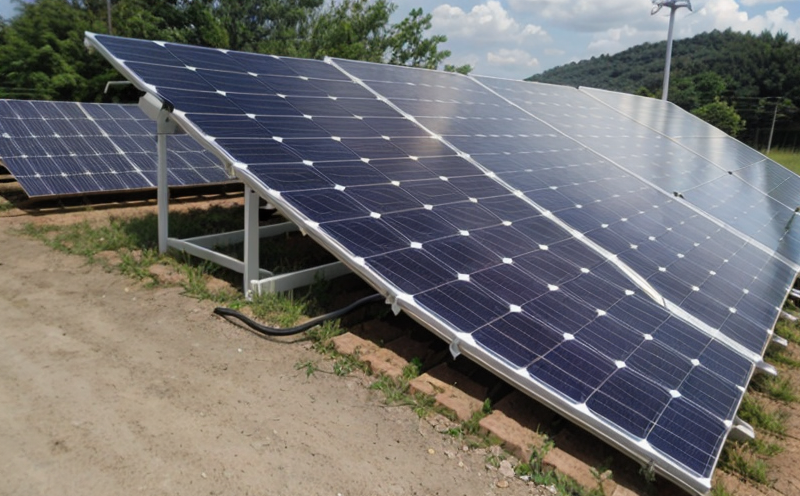IEC 61215-2 UV Preconditioning Testing
The IEC (International Electrotechnical Commission) 61215 series of standards is pivotal for the photovoltaic industry, ensuring that solar panels and photovoltaic modules meet stringent performance and safety requirements. The IEC 61215-2 UV Preconditioning Testing focuses specifically on the impact of ultraviolet (UV) radiation on the durability and efficiency of photovoltaic devices. This testing is essential for quality assurance, ensuring that solar panels can withstand environmental stresses over their operational life.
The purpose of this test is to simulate the effects of long-term UV exposure, which can degrade the performance and lifespan of a photovoltaic module. The test involves exposing modules to high-intensity UV radiation in a controlled laboratory setting for extended periods. This exposure helps identify potential weaknesses or failures that may arise due to environmental factors, ensuring that only robust and reliable products are brought to market.
The testing process begins with careful preparation of the photovoltaic module specimens. These modules are subjected to UV radiation under carefully controlled conditions, simulating real-world environmental stresses over a predefined period. The test is designed to mimic the cumulative effect of solar exposure, providing insights into how the module will perform in actual use.
Once the UV preconditioning cycle is completed, the modules undergo rigorous performance testing as per IEC 61215-1 and other relevant standards. This includes measuring electrical parameters such as open-circuit voltage (Voc), short-circuit current (Isc), maximum power point (Mpp), and fill factor (FF). Additionally, structural integrity tests are conducted to ensure that the module remains intact after UV exposure.
The data collected from these tests is crucial for understanding how well a photovoltaic module can withstand long-term environmental conditions. This information is vital for quality managers, compliance officers, R&D engineers, and procurement teams who rely on accurate and reliable test results to make informed decisions about product development and certification.
By undergoing this UV preconditioning test, manufacturers can identify potential issues early in the production process, allowing them to refine their manufacturing techniques and materials. This proactive approach not only enhances product quality but also reduces post-market failures, leading to increased customer satisfaction and trust in the brand.
The importance of IEC 61215-2 UV Preconditioning Testing cannot be overstated. It is a critical step in ensuring that photovoltaic modules meet international standards for safety, efficiency, and durability. This testing process plays a significant role in the renewable energy sector by promoting the development of high-quality solar technology.
Why It Matters
The IEC 61215-2 UV Preconditioning Testing is essential for ensuring that photovoltaic modules are capable of withstanding environmental stresses, particularly ultraviolet radiation. This test is critical because it helps manufacturers and quality managers identify potential weaknesses or failures in the early stages of production.
- Enhances Product Reliability: By simulating real-world conditions, this testing ensures that photovoltaic modules are reliable over their operational life.
- Improves Safety Standards: The test helps identify potential safety issues before the products reach the market, enhancing overall safety standards.
- Promotes Sustainable Development: Ensuring module durability and performance contributes to sustainable energy solutions by minimizing waste and extending product lifespan.
- Supports Compliance with International Standards: This testing aligns photovoltaic modules with international standards, ensuring they meet the highest quality and safety criteria.
The results of this test are vital for manufacturers who need to ensure that their products comply with IEC 61215-1 and other relevant standards. By adhering to these standards, manufacturers can build a reputation for producing high-quality solar technology, which is essential in the competitive renewable energy market.
For compliance officers and quality managers, this testing provides critical data that ensures adherence to regulatory requirements. Additionally, R&D engineers rely on these results to refine their product designs and improve performance. Procurement teams benefit from knowing that they are sourcing high-quality components that have been rigorously tested for durability and efficiency.
Benefits
- Enhanced Product Reliability: Ensures consistent performance under real-world conditions, reducing the risk of failure over time.
- Improved Safety Standards: Identifies potential safety issues early in the production process, enhancing overall product safety.
- Promotes Sustainable Development: By ensuring module durability and longevity, this testing contributes to sustainable energy solutions.
- Supports Compliance with International Standards: Ensures that photovoltaic modules meet stringent international standards for quality and safety.
The IEC 61215-2 UV Preconditioning Testing is not just a technical requirement but also a strategic investment in the longevity and performance of solar technology. By undergoing this testing, manufacturers can ensure they are delivering products that meet high-quality standards, thereby building trust with customers and stakeholders.
Environmental and Sustainability Contributions
The IEC 61215-2 UV Preconditioning Testing plays a crucial role in promoting sustainability within the photovoltaic industry. By ensuring that solar panels are durable and efficient, this testing contributes to reducing waste and extending product life, which is essential for sustainable development.
- Reduces Waste: Ensuring module durability minimizes the need for premature replacement or disposal of defective products.
- Extends Product Lifespan: By identifying potential issues early in the production process, this testing helps extend the operational life of photovoltaic modules.
- Supports Renewable Energy Goals: Ensuring high-quality solar technology is a key component in achieving renewable energy goals and reducing reliance on non-renewable resources.
The IEC 61215-2 UV Preconditioning Testing aligns with the broader objectives of the photovoltaic industry to promote sustainability, efficiency, and safety. This testing process is a vital step in ensuring that solar technology can contribute effectively to global efforts towards sustainable development.





